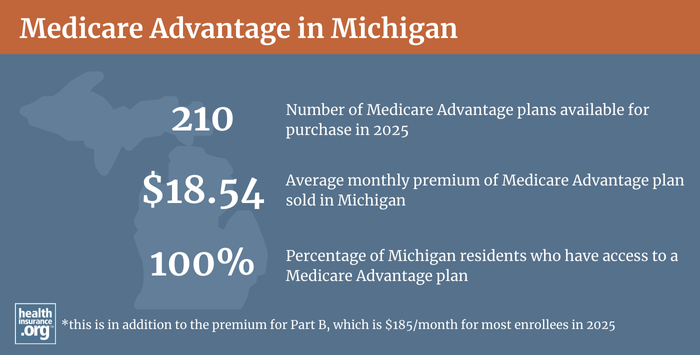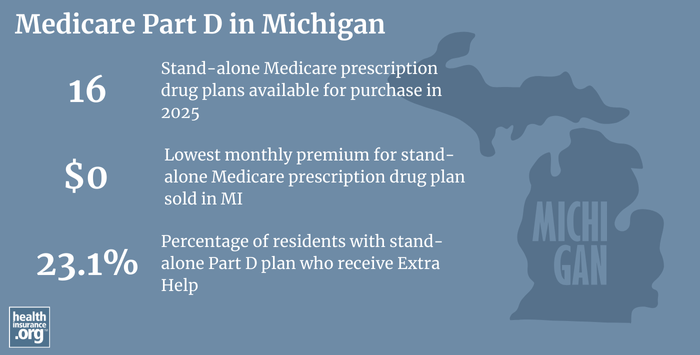Medicare in Michigan

62% of Michigan Medicare beneficiaries have Medicare Advantage plans
Key Takeaways
- More than 2.2 million Michigan residents are enrolled in Medicare.1
- 62% of Michigan Medicare beneficiaries are enrolled in Medicare Advantage plans.1
- Michigan has a robust Medicare Advantage market, with an average of 59 plans available to Medicare beneficiaries for 2025.2
- In Michigan, 26 insurers offer Medigap plans. But only four of them offer coverage to Medicare beneficiaries who are under age 65.3 (Legislation introduced in late 2024 would improve access to Medigap for under-65 beneficiaries.4 )
- There are 16 stand-alone Medicare Part D prescription drug plans available in Michigan for 2025, with premiums starting at $0 per month.5

Medicare enrollment in Michigan
As of August 2024, there were 2,247,187 people enrolled in Medicare in Michigan,1 amounting to about 22% of the state’s population.6
For most people, signing up for Medicare benefits is part of turning age 65. But Medicare enrollment is also triggered for younger people if they’re disabled and have been receiving disability benefits for 24 months, or if they have amyotrophic lateral sclerosis (ALS) or end-stage renal disease.
When we look at nationwide Medicare enrollment, more than 10.5% of beneficiaries are under the age of 65.7 It’s a little higher in Michigan, where about 12.5% of Medicare beneficiaries are eligible due to disability rather than age.1
Medicare’s annual election period (October 15 to December 7 each year) allows Medicare beneficiaries the chance to switch between Medicare Advantage plans and Original Medicare. Beneficiaries can also use the open enrollment period to add, drop, or change to a different Medicare Part D prescription plan, or switch from one Medicare Advantage plan to another.
People who are already enrolled in Medicare Advantage plans also have the option to switch to a different Medicare Advantage plan or to Original Medicare during the Medicare Advantage open enrollment period, which runs from January 1 to March 31.
Learn about Medicare plan options in Michigan by contacting a licensed agent.



Explore our other comprehensive guides to coverage in Michigan

We’ve created this guide to help you understand the Michigan health insurance options available to you and your family, and to help you select the coverage that will best fit your needs and budget.


Hoping to improve your smile? Dental insurance may be a smart addition to your health coverage. Our guide explores dental coverage options in Michigan.


Learn about Michigan’s Medicaid expansion, the state’s Medicaid enrollment and Medicaid eligibility.


Short-term health plans provide temporary health insurance for consumers who may find themselves without comprehensive coverage. Learn more about short-term plan availability in Michigan.

Frequently asked questions about Medicare in Michigan
What is Original Medicare?
Enrollment in Original Medicare (Medicare Part A, for hospital coverage, and Part B, for outpatient/physician coverage) is the same in every state, and is done via the Social Security Administration. Medicare Part A and Medicare Part B benefits do not vary from state to state, and the coverage can be used anywhere in the country.
So your Medicare eligibility in Michigan will follow the same federal guidelines that are used nationwide. But if you want supplemental coverage or would prefer to get your primary Medicare coverage from a private health insurance company, your options for Medicare Advantage plans, Medicare Part D prescription drug plans, and Medigap plans do vary from one state to another.
What is Medicare Advantage?
Private Medicare Advantage plans are an alternative to Original Medicare. Medicare Advantage provides all of the benefits of Original Medicare (hospital and outpatient/physician coverage), although out-of-pocket medical costs can vary considerably from what they’d be with Original Medicare. Most Medicare Advantage plans also include Medicare Part D prescription drug coverage and may offer extra benefits like fitness and dental/vision coverage,8 while also having lower premiums than Medigap plus Part D coverage (enrollees pay the premium for Medicare Part B, regardless of whether they have Original Medicare or Medicare Advantage).
But Medicare Advantage plans tend to have much more limited service areas and provider networks than the nationwide access provided by Original Medicare.9 There are pros and cons to either alternative, and no single solution works for everyone.
Medicare Advantage plans are provided by private insurers, and plan availability varies considerably across the country. Michigan’s Medicare Advantage market is robust, with an average of 59 plans available to residents in 2025 (plan availability varies by area).2
As of 2024, almost 62% of Michigan Medicare beneficiaries were enrolled in Medicare Advantage plans,1 versus just over 50% nationwide.7

What are Medigap plans?
Original Medicare does not limit out-of-pocket healthcare costs, so most enrollees maintain some form of supplemental coverage. Nationwide, 89% of Original Medicare beneficiaries had supplemental coverage through Medigap, an employer-sponsored plan or Medicaid in 2022.10
Medigap was the most commonly used source of supplemental coverage among Original Medicare beneficiaries. Medigap plans (also known as Medicare Supplement Insurance plans or MedSupp) will pay some or all of the out-of-pocket costs they would otherwise have to pay if they had only Original Medicare.
According to an America’s Health Insurance Plans (AHIP) analysis, 397,792 Michigan Medicare beneficiaries had Medigap coverage as of 2022,11 down from 423,319 in 2020.12 Medigap plans can only be used with Original Medicare (not with Medicare Advantage). And although overall Medicare enrollment has been increasing over time, Medicare Advantage enrollment has been growing much faster than overall Medicare enrollment. So the number of people with Medigap coverage in Michigan has declined over the last few years.
Medigap plans are sold by private insurers, but the plans are standardized under federal rules. There are ten different plan designs (differentiated by letters, A through N), and the benefits offered by a particular plan (Plan A, Plan F, etc.) are the same regardless of which insurer sells the plan. Pricing, however, varies from one insurer to another. Michigan enacted legislation in 2018 to ensure that Medigap plans sold in the state would comply with federal MACRA rules that prohibit the sale of Medigap plans that cover the Part B deductible (Plan C and Plan F) to anyone who becomes eligible for Medicare after the end of 2019.
Twenty-six insurers were actively selling Medigap plans in Michigan as of 2024.3 Michigan does not dictate how insurers adjust premiums based on enrollees’ ages, so insurers can use attained-age rating (the most common; premiums increase as the enrollee gets older), issue-age rating (premiums are based on the age the person was when they enrolled in the plan) or community-rating (premiums do not vary based on age).
Unlike other private Medicare coverage (Medicare Advantage plans and Medicare Part D prescription drug plans), there is no annual open enrollment window for Medigap plans. Instead, federal rules provide a one-time six-month window when Medigap coverage is guaranteed-issue. This window starts when a person is at least 65 and enrolled in Medicare Part B (you must be enrolled in both Medicare Part A and Part B to buy a Medigap policy).13
People who aren’t yet 65 can enroll in Medicare if they’re disabled and have been receiving disability benefits for at least two years, and more than 12% of Michigan Medicare enrollees are under age 65.1 Federal rules do not guarantee access to Medigap plans for people who are under 65, but the majority of the states, including Michigan, have implemented rules to ensure that disabled Medicare beneficiaries have at least some access to Medigap plans.
For at least twenty years, Michigan has had rules in place to ensure access to at least some Medigap plans for people under age 65. Current rules in Michigan (see MCL 500.3831, updated as of March 2019, to MCL 500.3831.amended) require Medigap insurers that also sell major medical health insurance to make Medigap Plans A and G (prior to 2020 this was Plan C) continuously guaranteed-issue for Medicare beneficiaries under age 65, although they can charge these enrollees higher premiums. And if the applicant did not already have major medical coverage under a plan offered by that insurer, the insurer can impose a pre-existing condition waiting period of up to six months (see MCL 500.3831(2)).
As of 2024, four insurers in Michigan offered Medigap policies (at least A and G) to people under age 65.3 The other 22 Medigap insurers in the state did not offer coverage to Medicare beneficiaries under age 65.
(Legislation introduced in late 2024 in Michigan would make significant changes to Medigap access for beneficiaries under age 65. The bill calls for all plans to be guaranteed-issue during the first six months after a person enrolls in Medicare Part B, regardless of age. It would also prohibit higher premiums for under-65 enrollees.4 But its future is uncertain.)
Disabled Medicare beneficiaries have access to the regular Medigap open enrollment period when they turn 65. At that point, they can select from among any of the available Medigap plans on the market, and get the lower premiums that apply to people who are aging into Medicare, rather than qualifying due to disability.
Disabled Medicare beneficiaries can choose instead to enroll in a Medicare Advantage plan. But Medicare Advantage plans have more limited provider networks than Original Medicare, requiring members to use providers within a fairly localized network. They also tend to use prior authorization for a wide range of services, and and total out-of-pocket costs can be as high as $9,350 per year for in-network healthcare in 2025,14 plus the out-of-pocket cost of prescription drugs.
Although the Affordable Care Act eliminated pre-existing condition exclusions in most of the private health insurance market, those rules don’t apply to Medigap plans. Medigap insurers can impose a pre-existing condition waiting period of up to six months if you didn’t have at least six months of continuous coverage prior to your enrollment. And if you apply for a Medigap plan after your initial enrollment window closes (assuming you aren’t eligible for one of the limited guaranteed-issue rights), the Medigap insurer can consider your medical history in determining whether to accept your application, and at what premium.
What is Medicare Part D?
Original Medicare does not provide coverage for outpatient prescription drugs.
Medicare beneficiaries who do not have drug coverage through Medicare Advantage, Medicaid, or an employer-sponsored plan need to enroll in a stand-alone Medicare Part D plan to have coverage for prescriptions. (Most Medicare Advantage plans have integrated Part D prescription drug coverage.8)
There are 16 stand-alone Medicare Part D prescription drug plans for sale in Michigan for 2025, with premiums starting as low as $0.5 Private insurers provide Medicare Part D prescription drug coverage.
1,910,571 Medicare beneficiaries in Michigan — 85% of the state’s total Medicare population — had Medicare Part D prescription drug coverage as of 2024. Almost 1.1 million beneficiaries had Part D coverage under Medicare Advantage plans, and over 818,000 had stand-alone Medicare Part D prescription drug coverage.1
Medicare Part D enrollment follows the same schedule as Medicare Advantage. Beneficiaries can enroll in a Medicare Part D prescription drug plan when they first enroll in Medicare, and then they have an opportunity during the Medicare Annual Election Period (October 15 to December 7) to switch to a different prescription drug plan. It’s important for enrollees to compare the available Medicare Part D prescription drug plans each year, to see how the various prescription drug plan options would cover their current prescription drugs and to determine whether they can save money by switching to a different Medicare Part D prescription drug plan for the coming year. If you sign up during the Fall Open Enrollment period, it will take effect on January 1.

How does Medicaid provide financial assistance to Medicare beneficiaries in Michigan?
Many Medicare beneficiaries receive financial assistance through Medicaid with the cost of Medicare premiums, prescription drug expenses, and services Medicare doesn’t cover – such as long-term care.
Our guide to financial assistance for Medicare enrollees in Michigan includes overviews of these programs, including long-term care coverage, Medicare Savings Programs, and eligibility guidelines for assistance.
What additional resources are available for Medicare beneficiaries and their caregivers in Michigan?
To learn more about Medicare in Michigan, you can contact MMAP, the Michigan Medicare/Medicaid Assistance Program, with questions related to Medicare coverage in Michigan.
The Michigan Department of Insurance and Financial Services is a state resource that can provide information, assistance, and customer service for a variety of issues related to health insurance. The Department oversees and licenses the insurers that offer health plans in the state, as well as the brokers/agents who sell the policies.
The Medicare Rights Center is a nationwide service, with a website and call center, that can provide information and answer questions related to Medicare eligibility, enrollment, and benefits.
Louise Norris is an individual health insurance broker who has been writing about health insurance and health reform since 2006. She has written dozens of opinions and educational pieces about the Affordable Care Act for healthinsurance.org.
Footnotes
- “Medicare Monthly Enrollment – Michigan, August 2024.” Centers for Medicare & Medicaid Services Data. Accessed Dec. 3, 2024 ⤶ ⤶ ⤶ ⤶ ⤶ ⤶ ⤶
- “Medicare Advantage 2025 Spotlight: A First Look at Plan Offerings” KFF.org. Nov. 15, 2024 ⤶ ⤶
- “Authorized Medicare Supplement Companies” Michigan Department of Insurance and Financial Services. Updated April 15, 2024 ⤶ ⤶ ⤶
- ”Michigan Senate Bill 1143” BillTrack50. Introduced Nov. 26, 2024 ⤶ ⤶
- Fact Sheet – Centers for Medicare & Medicaid Services. CMS, Sep. 27, 2024 ⤶ ⤶
- “U.S. Census Bureau Quick Facts: U.S., Michigan.” Census.gov, July 1, 2023 ⤶
- “August 2024 Medicare Monthly Enrollment – U.S.” Centers for Medicare & Medicaid Services Data, Accessed Dec. 3, 2024 ⤶ ⤶
- ”Medicare Advantage 2025 Spotlight: A First Look at Plan Premiums and Benefits” KFF.org. Nov. 15, 2024 ⤶ ⤶
- “Compare Original Medicare & Medicare Advantage.” Medicare.gov. Accessed Dec. 3, 2024 ⤶
- “A Snapshot of Sources of Coverage among Medicare Beneficiaries.” KFF.org. Sep. 23, 2024 ⤶
- “The State of Medicare Supplement Coverage.” Page 12. AHIP.org, May 2024 ⤶
- “The State of Medicare Supplement Coverage.” Page 11. AHIP.org, February 2022. ⤶
- “Get Ready to Buy.” Medicare. Accessed Dec. 3, 2024 ⤶
- ”Final Contract Year (CY) 2025 Standards for Part C Benefits, Bid Review and Evaluation” Centers for Medicare & Medicaid Services. May 6, 2024 ⤶

